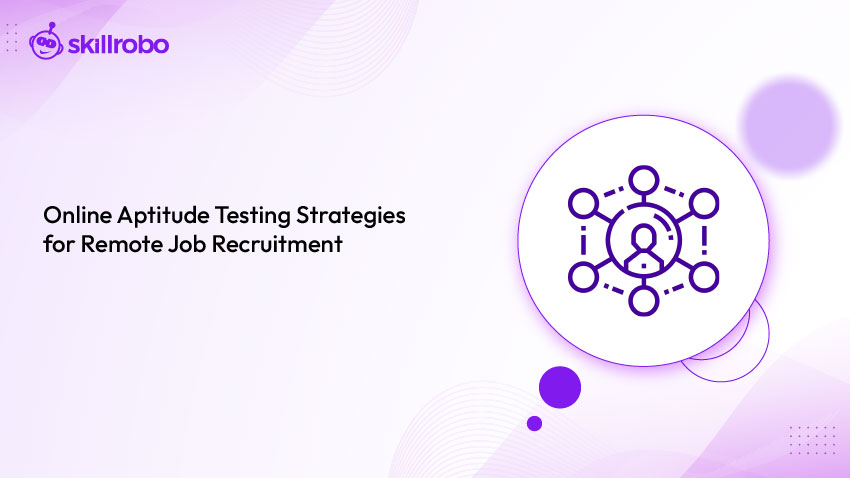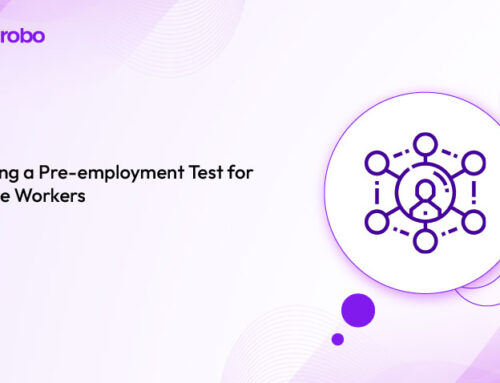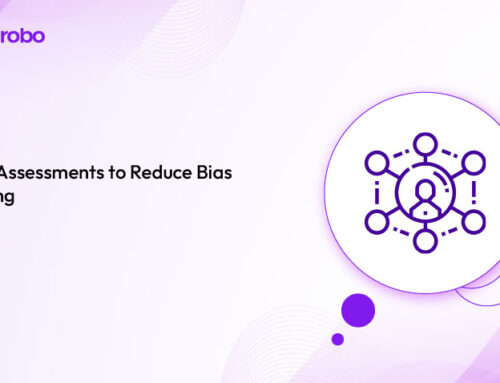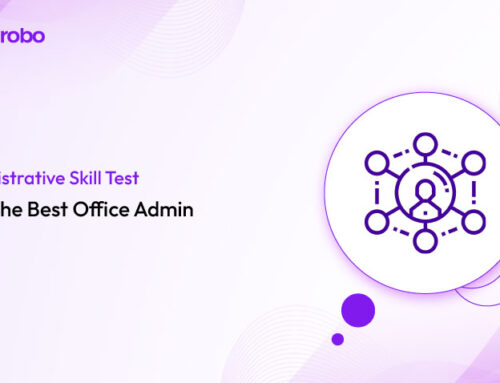
Key Takeaways
- Online aptitude tests streamline remote hiring by assessing skills and fit, ensuring candidates meet role-specific demands efficiently.
- AI-driven assessments enhance fairness, generating tailored questions and reducing bias in evaluating remote job applicants.
- Proctoring tools maintain test integrity, allowing recruiters to trust results from candidates in diverse locations.
- Real-time analytics from aptitude tests provide actionable insights, speeding up decisions for remote recruitment.
Mastering Remote Recruitment with Online Aptitude Testing
Remote hiring has transformed how businesses acquire talent, opening access to global candidates while introducing challenges like assessing skills without face-to-face interaction. Online aptitude testing provides a structured, efficient solution to evaluate cognitive abilities, technical expertise, and behavioral fit for virtual roles. These tests ensure hires meet job-specific demands, minimize bias, and accelerate hiring decisions, making them indispensable for HR professionals and hiring managers building remote teams.
The Society for Human Resource Management study found that 70% of recruiters prioritize skills-based assessments for remote roles, underscoring their predictive power.
In this blog, we’ll dive into strategies for designing, enhancing, and implementing online aptitude tests to optimize remote recruitment, offering practical insights for leveraging technology and overcoming obstacles effectively.
Key Benefits of Online Aptitude Testing
Online aptitude testing revolutionizes remote recruitment, offering HR professionals a powerful tool to assess talent globally. These key benefits—efficiency, fairness, trustworthiness, and speed—address modern hiring challenges head-on. By leveraging technology, recruiters build high-performing remote teams with confidence. This section highlights how these advantages drive success in virtual talent acquisition.
1. Efficiency
Online aptitude tests streamline remote hiring by quickly assessing skills and fit, ensuring candidates align with role-specific demands. This cuts through lengthy processes, delivering precise evaluations quickly. Recruiters save time, focusing on top talent. Businesses secure hires who meet job needs efficiently, boosting productivity in virtual work settings without delay.
2. Fairness
AI-driven tests enhance fairness by generating tailored questions, reducing bias in evaluating remote job applicants. Objective metrics prioritize skills over subjective factors like resumes, ensuring equitable assessments. Diverse candidates compete on merit, fostering inclusive teams. This approach aligns with equity goals, building stronger, more varied remote workforces effectively.
3. Trustworthiness
Proctoring tools maintain test integrity, ensuring reliable results from candidates in diverse locations. AI monitoring flags cheating without invasive oversight, balancing security and comfort. For critical roles, this verifies true ability remotely. Recruiters trust outcomes, confident that hires reflect genuine skills, upholding credibility in virtual hiring processes consistently.
4. Speed
Real-time analytics from aptitude tests provide actionable insights, enabling swift, data-driven recruitment decisions. Instant scores and rankings shortlist top performers fast, critical for urgent remote roles. This accelerates hiring timelines, reducing delays. Businesses stay competitive, securing talent quickly with precise data, and enhancing efficiency in virtual recruitment workflows seamlessly.
20 Strategies for Optimizing Aptitude Tests in Remote Recruitment
Remote hiring opens global talent pools but challenges traditional skill evaluation. Online aptitude testing bridges this gap, assessing abilities efficiently and fairly. With technology’s aid, recruiters can ensure hires excel in virtual roles.
Let’s explore strategies to enhance testing, leveraging tools like Skillrobo for effective remote recruitment.
1. Tailoring Tests to Job-Specific Needs
The core of effective aptitude testing is aligning assessments with a role’s unique requirements, ensuring candidates demonstrate the precise skills needed for remote success. A data analyst might need to prove mastery of statistical tools like Excel or R, while a virtual project manager must show organizational and problem-solving prowess for distributed teams. Customized tests cut through the noise of generic evaluations, targeting competencies that drive performance.
For example, a logistics firm hiring a remote coordinator might test route optimization to confirm virtual workflow efficiency. Tools for evaluating candidate skills enable recruiters to craft questions—coding for developers, and customer interaction for support—ensuring relevance. This precision equips hires to tackle responsibilities immediately, reducing the risk of onboarding someone lacking the practical expertise the job demands.
2. Creating Accessible Test Platforms
Complicated test platforms can deter remote candidates, especially those with limited tech access or digital familiarity. A simplified interface—intuitive navigation, fewer clicks, clear cues—lets applicants focus on showcasing abilities rather than battling software. This is vital for candidates in diverse setups, like shared laptops or mobile hotspots.
Picture a rural candidate with basic internet: a streamlined design ensures they can complete a customer service test without frustration, increasing participation. Skillrobo is a platform that emphasizes usability and supports tasks like coding challenges or cognitive puzzles without hindrance. This boosts completion rates, ensuring talent isn’t lost to technical barriers and broadening the remote applicant pool.
3. Accommodating Diverse Schedules
Remote candidates span time zones, balancing varied personal schedules—morning in Asia, midnight in Europe. Fixed test deadlines can exclude top talent due to timing clashes, thwarting global hiring goals. Flexible, 24-hour test windows let applicants pick a convenient slot, maintaining assessment rigor and security.
A tech startup might allow a developer on another continent to test at their leisure, avoiding location penalties. Skillrobo offers asynchronous options to widen the talent net while keeping consistency. This flexibility ensures remote recruitment captures the best candidates, no matter when or where they’re available, enhancing team quality.
4. Optimizing Test Length
Test duration requires balance—too lengthy, and candidates drop off; too brief, and depth suffers. A well-timed test, like 30 minutes for a sales role testing negotiation and reasoning, keeps engagement high while collecting key data. Respecting time is crucial in competitive remote markets.
A retailer might craft a concise virtual assistant test on multitasking and prioritization, skipping filler. Assessments on Skillrobo strike this balance, ensuring thoroughness without fatigue. Focused, manageable tests evaluate core skills effectively, encouraging completion and improving the caliber of remote hires.
5. Preparing Candidates with Practice
Unfamiliar formats or platforms can unsettle candidates, skewing results if nerves outshine ability. Practice questions before the real test familiarize applicants with the setup—multiple-choice, simulations, coding tasks—easing stress and leveling the field. This prep boosts confidence, letting talent stand out.
A tech firm might offer sample coding challenges, acclimating candidates to the editor. Skillrobo includes this, ensuring remote applicants—like a marketer testing analytics—start ready to excel. This step enhances accuracy and fosters a candidate-friendly process that reflects positively on recruitment efforts.
6. Generating Targeted AI Questions
AI revolutionizes testing by crafting questions that mirror real job tasks, ensuring relevance and performance prediction. For a remote support role, AI might create a conflict resolution scenario with a frustrated client, testing practical skills over theory. This eliminates irrelevant, generic prompts.
Assessments for communication abilities use AI to produce challenges—like drafting team updates—matching virtual needs. A retailer might test inventory scenarios for a coordinator, ensuring readiness. This targeted method confirms hires are equipped for their roles, not just test-savvy.
7. Minimizing Bias with AI
Bias—like favoring familiar backgrounds—can sideline diverse talent. AI counters this by prioritizing objective data—test scores, task completion—over subjective factors like names or education. This ensures remote candidates compete fairly, supporting diversity goals that enrich virtual teams.
A tech firm might miss a self-taught coder’s resume but spot their skill via an AI-scored test. Skillrobo’s data-driven approach ensures equity across pools. A Deloitte study found AI tools cut biased decisions by 30%, building diverse, innovative remote teams with varied perspectives.
8. Automating High-Volume Evaluations
High-volume hiring—like seasonal retail or call centers—needs speed without quality loss. AI scores tests instantly, managing large pools efficiently, so recruiters can quickly pinpoint top performers without manual slog. This automation is a game-changer for peak demand.
A retailer prepping for holidays might assess cashiers on speed and accuracy in hours via AI. Skillrobo comes with scalable solutions to maintain consistency. This lets recruiters focus on engaging talent, streamlining remote hiring during busy periods while upholding rigorous standards.
9. Adjusting for Skill Diversity
Candidates range from novices to experts, and AI adapts by scaling question difficulty dynamically. For project management, beginners might face basic prioritization, experts complex resource tasks, and ensuring fair, accurate assessments across experience levels in remote pools.
Skillrobo is equipped with AI test adjustments, sparing junior developers from advanced algorithms or seniors from simple loops. This flexibility identifies talent at every stage, aligning results with role needs and ensuring evaluations suit each applicant’s background effectively.
10. Improving Feedback with AI
Basic “pass/fail” outcomes disengage candidates. AI offers personalized feedback—detailed reports on strengths like problem-solving or gaps like time management—helping applicants grow, even if not chosen, and building goodwill in the process.
For a marketing role, a candidate might see high analytics but low creativity scores, guiding prep. Seyarc AI delivers this fast, keeping applicants engaged. This transparency fosters trust, encouraging reapplication or referrals, and strengthening the remote talent pipeline over time.
11. Securing Results with AI Proctoring
Cheating—like googling answers—threatens remote test validity, especially for technical roles needing proven skills. AI proctoring flags anomalies—tab-switching, rapid shifts—ensuring authentic results. This is vital for trust and accuracy in virtual settings.
For a developer’s technical skill evaluations, AI ensures coding isn’t compromised, reassuring recruiters. Advanced tools on Skillrobo monitor discreetly, verifying performance without distraction. This authenticity ensures candidates are judged on merit, safeguarding high-stakes remote hiring decisions.
12. Balancing Privacy in Proctoring
Overly intrusive proctoring—like constant webcam use—can alienate applicants. Minimal, effective methods, like browser monitoring, secure tests without breaching boundaries, and maintaining trust essential for a positive remote candidate experience.
A candidate in a shared home shouldn’t feel overly watched—Skillrobo focuses on activity flags, not surveillance. For a sales test, this secures results discreetly, encouraging participation. Respectful proctoring ensures the process feels fair and professional, not invasive.
13. Flexing for Home Environments
Remote testing often happens amid distractions—dogs barking, kids crying. Flexible proctoring adjusts for minor interruptions, avoiding unfair penalties while catching deliberate cheats, ensuring focus stays on skills, not external noise.
A parent applying remotely shouldn’t fail over background sound—Skillrobo’s tools adapt, maintaining fairness. For a multitasking test, only significant breaches like external help are flagged. This levels the field, ensuring diverse applicants aren’t penalized by home settings.
14. Supporting Flexible Proctoring
Live proctoring limits candidates to set times, excluding those in distant zones or with commitments. Asynchronous tools enable secure testing on flexible schedules, locking tests post-completion to prevent tampering, and broadening access without security loss.
A retailer might let a support candidate test overnight, secured by asynchronous proctoring. This keeps an Asian hire viable despite a European schedule, enhancing remote quality. Flexibility ensures top talent participates, making assessments inclusive and practical.
15. Clarifying Proctoring Rules
Unclear rules—like allowed breaks or tech setup—confuse candidates. Detailed instructions, like specifying calculator use for finance tests or pre-test checks, set expectations, reduce stress, and ensure compliance for smooth assessments.
A logistics applicant might need to know headphones are okay but phones aren’t— the Skillrobo guidelines clarify this. For problem-solving tests, this prevents accidental violations, boosting focus. Clear communication ensures remote assessments run fairly and confidently for all.
16. Providing Fast Analytics
Delayed test reviews slow remote hiring, risking talent loss. Real-time analytics deliver instant results—scores, rankings, breakdowns—streamlining shortlisting. For admin roles, recruiters spot top organization or multitasking skills quickly, keeping pace agile.
A retailer filling virtual assistant positions uses insights to prioritize candidates in hours. This speed fills urgent roles fast, aligning with business needs. Instant analytics keep remote hiring competitive, securing hires before they slip away.
17. Enhancing Workflow Efficiency
Manual data analysis bogs down recruiters, especially with large pools. Automated reports rank candidates and summarize strengths, freeing HR for interviews or strategy. For seasonal hiring, this efficiency is vital.
A retailer hiring support reps uses analytics to prioritize instantly, skipping hours of review. This keeps remote processes lean, balancing thoroughness and speed. Streamlined workflows let recruiters refine hiring, not wrestle data.
18. Monitoring Hiring Trends
Analytics spot patterns—like growing collaboration or tech skill needs—over time, shaping future test designs. This ensures assessments evolve with remote work shifts, keeping recruitment competitive and ahead of industry curves.
A firm noticing weak teamwork might tweak tests— data tracks this. This adaptability aligns hiring with priorities like remote tools and securing hires who thrive in evolving virtual roles through proactive adjustments.
19. Ensuring Tech Inclusion
Unstable internet or old devices can exclude candidates, especially in remote areas. Low-bandwidth or offline-compatible tests ensure participation, focusing on skills like cognitive abilities, not tech barriers, for equitable hiring.
A rural marketer shouldn’t miss out due to connectivity—Skillrobo adapts, broadening access. This inclusivity captures diverse talent, ensuring ability, not infrastructure, deciding success, and leveling the remote field.
20. Explaining Test Goals
Unclear test relevance can disengage candidates. Explaining how assessments—like problem-solving for managers—link to roles builds trust, showing the process values fit, not just compliance, enhancing participation.
A finance firm might tie math tests to accuracy— Skillrobo intros clarify this. For sales, linking persuasion to goals keeps candidates invested, improving remote outcomes through transparency.









